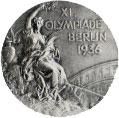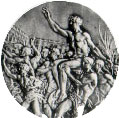Dhyan Chand - The Legend Lives On
Biography of Hockey Wizard Dhyan Chand
By Niket Bhushan, Wiley Eastern Ltd., 1992
 hirty six
years after Dhyan Chand played for India in the 1936 Berlin Olympics, his son
Ashok Kumar played for India in the 1972 Munich Olympics.
hirty six
years after Dhyan Chand played for India in the 1936 Berlin Olympics, his son
Ashok Kumar played for India in the 1972 Munich Olympics.
Reading the biodata of the players in the 1972 Indian Olympic hockey team, a man came on a
stretcher to meet Ashok in Munich. He told him that he had seen Dhyan Chand play in the
1936 Olympic hockey final, and wanted to meet his son and tell him what a great
player his father was. He told Ashok that Dhyan Chand had made the ball very
difficult to spot as he had it glued to his stick!
Invited to the Munich Olympics as a special guest, Dhyan Chand was unable to
go because he just had an eye operation.
Ashok's uncle, Roop Singh, had a street named after him in the Munich Olympic
stadium complex. This was a rare honour for any sportsman, let alone an Indian
player. The German Olympic Committee had honoured Roop Singh because he had
scored the maximum number of goals in the 1936 Berlin Olympics hockey
tournament.
The German Olympic Committee sent Roop Singh a map of the Munich Olympic
stadia, showing the street named after him. Roop Singh was also invited as a
special guest, but like Dhyan Chand, he could not visit Munich.
Despite the respect and admiration for Roop Singh abroad, he was treated
pathetically by the Indian Hockey Federation. Roop Singh endured financial
hardships, so much so that when he was seriously sick with tuberculosis, his
family was forced to sell his Olympic gold medals and other silver trophies to
raise funds for his treatment. This is the irony and tragedy of Indian hockey,
that continues to this present day.



1936 Berlin Olympics gold medal


